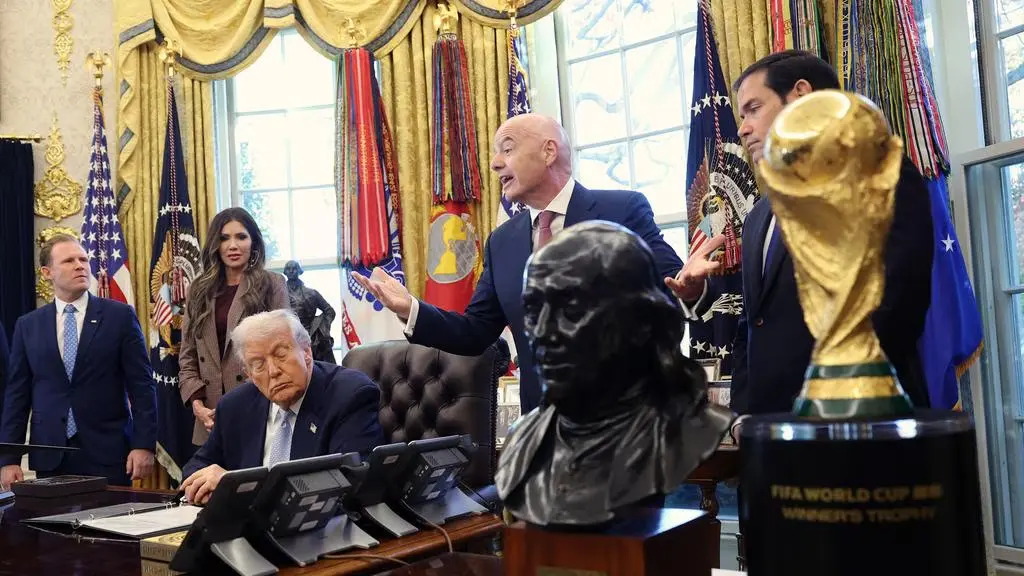By the time the final whistle blew on the latest international window, the road to the 2026 World Cup already felt like a tournament in itself. From Curacao’s miracle in Kingston to Haiti’s journey out of a war zone and the shadow of presidential bans hanging over jubilant fans, the story of World Cup 2026 qualifications and political issues is no longer just about football. It is about borders, bans, courage and the way this game keeps squeezing joy out of the tightest corners of the planet.
New format, new tensions and 42 teams already in
The 2026 World Cup in the United States, Mexico and Canada will be historic on many levels. It will be the first time three countries co-host the tournament and the first time the field expands from 32 to 48 teams. As it stands, 42 of those 48 places are already taken, with another batch to be decided through play offs in March next year.
On the pitch, the landscape looks familiar on one side and completely fresh on the other. Lionel Messi’s Argentina and Cristiano Ronaldo’s Portugal are in, as expected, and once again they headline a global cast that includes football giants like Brazil, France, Germany and England.
Yet the real drama of this qualification cycle lies in the nations for whom a ticket to 2026 feels like a life changing event, and in the politics that threaten to blur the joy of qualification for some of them.
Curacao and the smallest World Cup nation in history
If there is one story that captures the magic of these qualifiers, it is Curacao. The tiny Caribbean island of just over 150,000 people, a self governing part of the Netherlands, has become the smallest nation ever to qualify for a World Cup. They did it the hard way, with a goalless draw against Jamaica in Kingston that secured top spot in their group and an automatic place in North America.
Veteran coach Dick Advocaat, the 78 year old known as “the Little General”, had to watch the decisive match on television at home in The Hague because of family reasons. Even from a distance, the tension almost overwhelmed him. He later admitted that Curacao’s achievement was “the craziest thing” he had ever experienced as a coach, a remarkable statement from a man who has guided the Netherlands to a World Cup quarterfinal and a European Championship semifinal.
Curacao survived a truly frantic finish. In stoppage time, Jamaican substitute Isaac Hayden went down in the area and referee Ivan Barton pointed to the penalty spot. For a moment, the island’s dream seemed to shatter. Then VAR intervened. After reviewing the footage on the pitchside monitor, the referee reversed his decision. The fairytale stayed alive, and with the final whistle, Curacao booked their place in history.
Advocaat has been the architect of this run since taking charge in January of last year. He convinced a group of Dutch born players with Antilles roots to commit to Curacao, and all the players who faced Jamaica were born in the Netherlands. He spoke openly of the rough road they travelled, from the poor pitches to the gruelling away trips, and how he always told his squad it would come down to the very last match. In the end, he was right, and now he will arrive at the World Cup as the oldest coach in the competition’s history, leading its smallest ever participant.
Haiti’s return carried by resilience and a Kenyan connection
If Curacao’s tale is about scale and improbability, Haiti’s is drenched in resilience. The Caribbean country has qualified for the World Cup for the first time since 1974, a return to the global stage that comes against a backdrop of extreme violence and political collapse.
Haiti did not play a single home qualifier. Armed gangs dominate large parts of the country, including the capital Port au Prince, which is largely under the control of gang leader Jimmy “Barbecue” Chérizier and his allies. International peacekeeping forces, including Kenyan troops, have been deployed in an attempt to restore order. In that climate, footballers had to become permanent travellers, refugees of their own home fixtures.
The team, known as Les Grenadiers, is coached by Frenchman Sebastian Migne, a familiar name to Kenyan fans. Migne once led Harambee Stars back to the Africa Cup of Nations in 2019 after a 15 year absence, and he has now repeated the trick on a grander stage. Appointed Haiti coach in 2024, he has never actually set foot in the country because it is too dangerous. As he told France Football via BBC Sport, international flights are not landing in Haiti and living there is simply impossible for him.
On the pitch, Haiti’s route to North America was a roller coaster. They opened their group with draws against Honduras and Costa Rica, results that kept them alive but hardly screamed destiny. A defeat to Honduras later in the campaign might have crushed another team’s spirit. Instead, Haiti responded with a crucial win over Costa Rica, then sealed qualification with a 2 0 victory against Nicaragua. First half goals from Louicius Deedson and Ruben Providence were enough to win Group C ahead of Honduras and claim one of CONCACAF’s automatic spots.
Migne’s story adds a deeply human layer to this feat. He is once again working far from the limelight of Europe, guiding a team that trains and plays with uncertainty always lurking. Yet, just as he did with Kenya, he has found a way to channel adversity into performance. For Haiti, a second World Cup appearance is not just a sporting achievement, it is a rare unifying symbol for a nation in turmoil.
Trump’s travel bans and the uneasy joy of qualification
Haiti’s celebrations are complicated by events far from the pitch. The return of Donald Trump to the White House earlier this year has revived the debate about how global politics can intrude into global football. As part of his renewed anti immigration drive, Trump has imposed travel bans on citizens of 12 countries, with seven others facing partial restrictions.
The full ban list includes Afghanistan, Myanmar, Chad, Congo, Equatorial Guinea, Eritrea, Haiti, Iran, Libya, Somalia, Sudan and Yemen. Among the 42 teams already qualified for the 2026 tournament, two of those countries stand out. Haiti and Iran both booked their places on the pitch, yet their citizens now face serious uncertainty about whether they will be able to travel to the United States to watch their national teams.
Iran, a regular at recent World Cups, was among the first nations from Asia to qualify. A draw with Uzbekistan in March secured a fourth consecutive appearance on the biggest stage. For Iranian players and coaches, the route into the United States looks clearer, at least on paper, thanks to a specific exemption in Trump’s executive order.
The order allows any athlete or member of an athletic team, including coaches and essential support staff, to travel to the United States for major sporting events, as determined by the Secretary of State. That means players from Haiti and Iran, along with their coaching and backroom teams, should technically be allowed entry for World Cup matches.
The problem, and the heavy emotional weight, lies with the fans. The exemption does not extend to ordinary supporters or their families. For thousands of Haitians and Iranians in their home countries, and in some cases in the diaspora, the dream of following their team in person now collides with visa realities and security lists.
FIFA president Gianni Infantino has been vocal in insisting that a World Cup must be open to everyone. Back in 2017 he argued that for FIFA competitions to work, all teams, their officials and their supporters must have access to the host country, otherwise there is effectively no World Cup. Those words now hang over the 2026 edition as a reminder that football’s core promise, bringing the world together, is under strain.
In negotiations with Trump’s administration, FIFA has already secured one concession that tries to ease the tension. Fans who hold World Cup match tickets will be able to apply for a special FIFA pass that speeds up their visa interview process. That pass is designed to cut waiting times by six to eight weeks, a significant improvement in an overstretched immigration system.
However, United States Secretary of State Marco Rubio has made it clear that this is not a shortcut to automatic approval. Applicants will still need to pass all existing security checks, and a ticket provides no guarantee that a visa will be granted. For supporters from banned or partially banned nations, including Haiti and Iran, the road to the 2026 World Cup might be every bit as difficult as the qualifying journey on the field.
FIFA bans and the long shadow of politics
Trump’s policies are not the first time politics and the World Cup have collided. Football’s governing body, FIFA, often proclaims neutrality, yet history shows that it repeatedly finds itself pulled into geopolitical storms. In some cases, FIFA has gone further than host governments, imposing its own bans on participation to protect what it calls the integrity of its competitions.
Russia is the most current and prominent example. Since its invasion of Ukraine in early 2022, Russia has been suspended from all FIFA sanctioned competitions. The 2018 World Cup hosts did not take part in the 2022 tournament in Qatar and were completely excluded from the qualification process for 2026. The ban has spread through the game, with Russian clubs like Zenit St Petersburg and CSKA Moscow also removed from UEFA competitions. For Russian footballers and supporters, the World Cup has simply disappeared from the horizon.
The story of South Africa during the apartheid era shows how long such exclusions can last. The country was first suspended from FIFA in 1961, at the height of institutional segregation. Although briefly reinstated in 1963 by FIFA president Stanley Rous, who was sympathetic to South Africa’s regime, the compromise was controversial. At one point, South Africa were placed in Asian qualifying groups to avoid African opposition, a reminder of how artificial solutions can be when politics is at play.
Eventually, the global pressure became too intense. Under Joao Havelange, Rous’ successor, South Africa was suspended again in 1976, and that ban remained in place until 1992. Only after the end of apartheid and the birth of a new political era did the country fully return to world football. In an irony of history, South Africa would go on to host the 2010 World Cup, the first on African soil.
Yugoslavia provides another stark case. During the Yugoslav Wars, the United Nations Security Council ruled in 1992 that the Federal Republic of Yugoslavia, which covered what is now Serbia and Montenegro, should be banned from major international sporting events. As a result, the national team was excluded from the 1994 World Cup in the United States. Politics did not simply overshadow football, it erased an entire campaign.
More recently, Israel has faced pressure from some quarters to be expelled from qualification because of its actions in the Gaza Strip. Ultimately, these calls did not result in a FIFA ban, and Israel failed to qualify for sporting reasons only. Yet the debate is another reminder that accusations, sanctions and wars are rarely far from the orbit of football’s biggest stage.
Beyond classic political disputes, FIFA has also excluded teams for what it sees as violations of its statutes, such as government interference in football federations. In this cycle some countries, like Congo, have not been part of the 2026 qualification process for various non sporting reasons mentioned in reports, underlining that not every absence from a World Cup is purely about results on the pitch.
| CASINO | BONUS | INFO | RATING | |
|---|---|---|---|---|
|
bonus
Sign up for KES 46 bonus after first deposit!
See 11 Bonuses
|
info
20+ crash & instant games, Aviator bonuses BK 0000704 |
|||
|
bonus
500% bonus on first 4 deposits!
See 5 Bonuses
|
info
10 crash games, mobile-first site, 500% welcome bonus BK 000678 |
|||
|
bonus
Bonus on 1st deposit: Free Bet up to 10,000 KES
See 3 Bonuses
|
info
BCLB 0000794 Licensed betting platform with a variety of bonuses and high odds |
|||
|
bonus
Claim weekly freebet codes on Telegram!
See 5 Bonuses
|
info
6,000+ casino games, renowned providers, mobile-optimized gamesBK 0000761, PG 0000461 |
The global qualifying picture and the rise of new contenders
While the political debates rage, the pure football stories are rich and varied. The 2026 format has opened the door for more teams, and many have sprinted through that door with historic intent.
North America and the Caribbean
The CONCACAF region has six automatic spots, with the three co hosts, the United States, Mexico and Canada, all guaranteed places. They are joined by Curacao, Panama and Haiti, the latter returning to the big stage after half a century.
Jamaica, so often on the cusp of major tournaments, will have to navigate the inter confederation play offs alongside Suriname. For the Reggae Boyz, the image of the ball crashing against the woodwork twice and the crossbar once in that draw with Curacao may linger for years. For Suriname, the play offs represent a rare opportunity to step into the limelight.
South America
In South America, six automatic berths have gone to familiar heavyweights. Defending champions Argentina and record winners Brazil are in, along with Ecuador, Colombia, Uruguay and Paraguay. Bolivia still has a route through the inter confederation play offs, a lifeline in a region where qualifying is notoriously unforgiving.
Africa
Africa’s qualifying campaign has delivered a mix of tradition and surprise. Nine groups, nine automatic tickets. The continent’s new darling is Cape Verde, which has earned a first ever World Cup place by holding off traditional power Cameroon. For an island nation with a growing football reputation, this is a monumental breakthrough.
They join a cluster of established African powers. Egypt, Senegal, Ivory Coast, South Africa, Morocco, Algeria, Tunisia and Ghana have all secured their tickets. Nigerian journalist Raphael Abiola summed up the feeling on the continent by noting that apart from Nigeria and perhaps Cameroon, “all of Africa’s big boys” will be in North America. After Morocco’s historic semifinal run at the last World Cup, there is a sense that African teams will arrive not just as participants but as genuine contenders.
The Democratic Republic of Congo, meanwhile, is still in the hunt through the play offs. For DRC, a spot in 2026 would mean far more than ticking a box, it would mark a new chapter in a long, complicated football story.
Europe
Europe has 16 slots in total, 12 of which have already been filled by group winners. Germany, Switzerland, Scotland, France, Spain, Portugal, the Netherlands, Austria, Norway, Belgium, England and Croatia have all booked their places, providing a backbone of traditional football power.
The remaining four European spots will emerge from a high wire play off campaign. Second placed teams Czech Republic, Albania, Wales, Italy, Bosnia and Herzegovina, Poland, Ireland, Turkey, Ukraine, Denmark, Kosovo and Slovakia have all been thrown into the mix. They are joined by Sweden, Northern Ireland, Romania and North Macedonia via UEFA Nations League rankings.
The presence of Italy in that pack is particularly striking. The four time world champions failed to reach both the 2018 and 2022 tournaments and now face yet another pressure cooker route to redemption. For smaller nations like Albania or Kosovo, the play offs represent a rare chance to write a new script in European football.
Asia and Oceania
Across in Asia, eight teams have already booked their tickets. Japan, Iran, Uzbekistan, Australia, South Korea, Jordan, Saudi Arabia and Qatar will fly to North America. Iraq could yet join them by coming through the play offs, which would deepen the Asian presence in 2026 and further diversify the tactical and cultural mix of the tournament.
In Oceania, New Zealand has secured the region’s single guaranteed slot, continuing its role as the area’s standard bearer. New Caledonia still has a lifeline through the inter confederation play offs, a route that has been kind to Oceania in the past but is never straightforward.
Ronaldo’s red card and individual drama on the road to 2026
The team narratives sometimes overshadow the fact that individual stars are still carving out their final chapters. Cristiano Ronaldo, who will be 41 by the time the tournament kicks off, is at the centre of one such subplot. Portugal qualified comfortably, yet Ronaldo’s red card for violent conduct in a qualifier against Ireland may cost him the chance to start the World Cup on the pitch.
The length of any suspension is still to be finalised, and the Portuguese federation are reportedly ready to appeal depending on how many games he is ruled out of. For a player who has built his career on rewriting records and resisting the idea of decline, even missing a couple of group matches in what could be his last World Cup would be a cruel twist.
The human side of a politically charged World Cup
Looking at the 2026 World Cup picture today means looking well beyond tactics and form. Curacao, the smallest World Cup nation ever, is heading to North America with a 78 year old coach who calls their qualification the craziest achievement of his long career. Haiti, guided by a coach who has never been able to visit the country he manages, has defied war and fear to return to the global stage.
At the same time, Haitian and Iranian fans are navigating the uncertainty of travel bans. Russian football is in international limbo. The stories of apartheid South Africa and Yugoslavia sit in the background as reminders of how deeply political decisions can shape sporting destinies.
The draw for the World Cup will be held on December 5, another milestone in a journey that has already produced more emotion and tension than many full tournaments. The balls will be placed in pots, the groups will be formed and broadcasters will talk about match ups and styles.
But beneath every draw graphic there will be undercurrents. The supporters wondering if they will receive a visa in time. The players who grew up on battered pitches in Cape Verde or Curacao. The Haitian kids who see their flag on a World Cup scoreboard for the first time in their lifetime and, for a moment, feel only pride, not fear.
World Cup 2026 is shaping up to be a collision of football and politics, of bans and exemptions, of history and hope. As ever, the ball will roll, and with it, the game will offer its own answer to the divisions of the world, an answer written in goals, saves and the roar of crowds who make it through every barrier just to be there.










